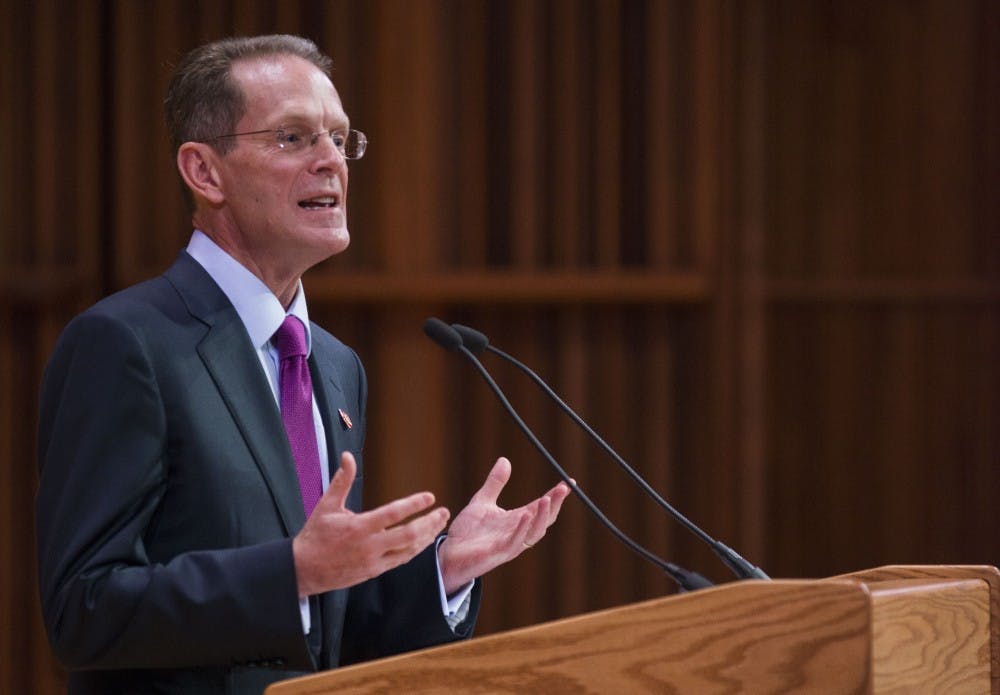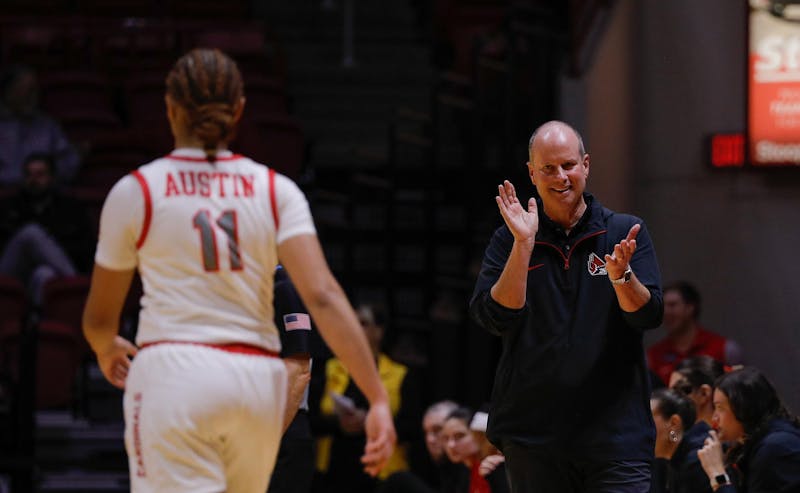Ball State faces a claim it violated Indiana’s Open Door Law, continuing months of criticism about transparency that began with former President Paul W. Ferguson's resignation.
Ball State announced Ferguson's replacement, Geoffrey S. Mearns, on Jan. 24 during a meeting of the Board of Trustees in Sursa Performance Hall.
The next day, Vivian Edwards, vice president of Ball State’s Progressive Student Alliance, filed a complaint with the Indiana Public Access Counselor, a state official who assists the public with open-government matters, claiming the Board of Trustees violated the state’s Open Door Law by failing to give 48-hour notice of the board meeting.
The complaint specifically addresses the university-wide email sent out at 8:57 a.m. Jan. 23 — 29 hours before the board meeting.
Joan Todd, a spokesperson for the school, said the university would not comment on the complaint itself, but that Ball State complied with the transparency law.
“The university will respond to the Public Access Counselor regarding the merits of the pending complaint,” Todd said in an email to the Daily News. “We are confident that university practices are consistent with the Open Door Law.”
The law requires that agencies either post notice of meetings at their public offices or at the site of the meeting. Also, agencies must provide notice to media outlets that have submitted written requests for notice for the current calendar year.
Ball State said it complied with the state law because it posted notice inside the lobby of the Frank A. Bracken Administration Building 48 hours in advance of the meeting, Todd said.
The email sent out by the university wouldn’t likely count as part of the 48-hour notice rule, said Steve Key, executive director of the Hoosier State Press Association.
“When the email was sent out is not relevant because that’s not what the Open Door Law requires,” Key said. “It’s just an invitation asking people if they want to
News media, including the Daily News, receive meeting notices through campus mail or the U.S. postal system. Campus mail doesn’t come with a postmarked date, making it difficult to tell whether notices were sent out in time to meet the law’s requirement.
Edwards, a senior chemistry major, said the email sent to the campus community prompted her complaint.
“I filed [the complaint] because I am upset with the administration,” Edwards said. “They want to say that they promote transparency, but every time we try to find answers on the Koch-Schnatter agreement or the president or health care or the $13 million that was taken, there is this lack of transparency [with these issues]. They seem to obstruct us at the every turn.”
When told of the university’s response, Edwards said she was skeptical.
“I don’t know if their side is true,” she said. “Complying with the letter of the law is not the same as complying with its spirit. The way people receive their information is online. I don’t think
At Indiana University, meanwhile, the schedule of future board meetings is posted online, and the 48-hour notice is sent by email, along with the physical posting required by law.
Forty-eight hours before a meeting, the university issues a press release by email, while still posting the notices required by the Open Door Law.
Also, IU live tweets board meetings using #IUBOT and sends out an email newsletter
“They are definitely going above and beyond what’s required
Ball State does post a schedule of board meetings on its website. Board agendas appear online when made available.
Ball State's reliance on the physical posting system only means that someone who wanted an actual 48-hour notice of the meeting, without any delay, would presumably have to visit the administration building daily to see if any notices were posted.
Asked whether that was what the university actually expected people to do, spokesperson Todd replied by email:
“Of course, I can’t speculate on what each and every one of our smart, capable students will choose to do - it’s up to them!”
The Board of Trustees serves as the fiscal body of the university, setting the school's multimillion dollar budget, deciding everything from tuition increases to campus renovations.
Mearns, who is the current president of Northern Kentucky University, faced questions about the university’s perceived lack of transparency in his first hour at Ball State on Jan. 24.
“I believe transparency is critically important. I talked about the value of promoting civility and courtesy,” Mearns said in his first address to the university. "In order to encourage people to participate collaboratively and cooperatively, there is the need to be transparent.”
The purpose of the 48-hour notice is to make it easy for the people to attend public meetings.
“If you’re a citizen, you need advanced notice to take time off work or find someone to watch the kids” Gerry Lanosga, president of the Indiana Coalition for Open Government, said. “It’s important we do what we can to make it easy for people to participate in the process.”
The opening paragraph of the state law states it should ”be liberally construed with the view of carrying out its policy.”
However, this language deals with how courts should interpret the law, Key said.
“The presumption is always openness with public meetings,” he said. “With exceptions, they should be interpreted narrowly.”
Most violations of the Open Door Law occur in the technical area, meaning an agency forgot something like holidays
Ultimately, Edwards said she isn’t out to hurt the board, she just wants more transparency.
“The public access counselor’s opinion on whether this is a violation of public access laws is the most important part in my mind,” Edwards said. “I’m not so much concerned with punishing the Board of Trustees or getting them in trouble. I want them to abide by the same rules that we have to play by.”
Read the complaint below. Logan Edwards is Vivian Edwards' legal name.





The Daily News welcomes thoughtful discussion on all of our stories, but please keep comments civil and on-topic. Read our full guidelines here.